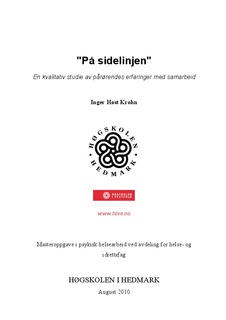"På sidelinjen" En kvalitativ studie av pårørendes erfaringer med samarbeid
Master thesis
Permanent lenke
http://hdl.handle.net/11250/132542Utgivelsesdato
2010Metadata
Vis full innførselSammendrag
Gjennom de siste tiår har psykiatritjenesten i Norge vært gjennom omfattende
endringsprosesser. En av de største endringene er at mennesker med alvorlige psykiske
lidelser nå bor i egne boliger i sitt lokalsamfunn. Døgnopphold i de psykiatriske
institusjoner er redusert, og det har ført til at psykiatriske pasienter har blitt mer avhengig av
det lokale hjelpeapparat Pasientens pårørende er ofte det eneste sosiale nettverk til
pasienten, og de er å anse som en viktig ressurs for pasienten. Samarbeid med de pårørende
kan medføre at pasienten får færre og kortere innleggelser samtidig som pårørendes egne
behov kan ivaretas slik at de kan være en ressurs for pasienten.
Hensikten med studien var å få kunnskap om hvordan pårørende til voksne pasienter innlagt
en avdeling ved et distriktspsykiatrisk senter opplevde samarbeidet med de ansatte.
Datainnsamlingen er basert på fem intervjuer med pårørende, og en kvalitativ
innholdsanalyse som beskrevet av Granheim og Lundmann har blitt fulgt. Studien inngår
som en del av et større forskningsprosjekt.
Studiens hovedfunn har vist betydningen av det å føle seg anerkjent som den viktigste
faktoren for opplevelsen av et godt samarbeid. Selv om pårørende fikk informasjon om
diagnose og medisiner, var ikke dette tilstrekkelig. De etterlyste informasjon om behandling
og metode. Pårørende opplevde at taushetsplikten ble brukt som et hinder til å få
informasjon. Pårørende erfarte at de ikke ble hørt og at det de hadde av kunnskap om
pasienten ikke ble verdsatt av de ansatte. Videre viste studien at de pårørende opplevde
manglende respekt fra de ansatte og at dette kom til syne gjennom deres holdninger.
Pårørende var i behov av støtte for egen del, både av emosjonell og praktisk karakter. De
ønsket å være en ressurs for pasienten, men opplevde ofte det motsatte. Engelsk sammendrag (abstract):
In Norway the psychiatric services has been through a thorough process of change during the
last decades. One of the most significant changes is that people, who suffer from a serious
psychiatric disorder, now may stay in their own homes in their local environment. Having
reduced the number of 24-hour institutional admissions, the patient has become more
dependent on the local health care system. Relatives very often find themselves as the
patients only network, and must be regarded as an important resource for the patient.
Cooperation with the relatives may result in a better understanding of the relative’s needs, as
well as shorter and fewer admissions for the patient.
The aim of my study was to gain knowledge on how relatives of grown up patients, admitted
at a district psychiatric ward, experienced cooperation with the employees of the institution.
The computerized material is collected from five interviews conducted with relatives, and a
qualitative analysis of content, as described by Granheim and Lundmann, was conducted.
This study is a part study, in a larger scientific project.
The master file of this study has shown that, the relatives feeling of being recognized by the
professionals, is the single most important factor for good cooperation. Good information on
diagnosis and medication was not alone enough. The relatives asked for information on the
chosen treatment and method. The relatives found professional secrecy used as a mean of
avoidance for handing down information. The relatives also experienced that they were not
listened to and the professionals did not appreciate what they considered important
information about the patient. Further more the study shows a lack of respect for the relatives
by the professionals, who shows this in their attitude. The relatives were in need of support
for their own emotional well being, as well as in practical matters. They wanted to be a
resource for the patient, but too often experienced the contrary.
Key Words
Serious psychiatric disorders, Professionals, relatives, cooperation, district psychiatric ward
and qualitative analysis of content
